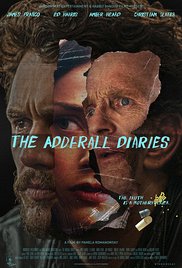Father-son dynamics come to the fore of “The Adderall Diaries” along with true crime, drug abuse, S&M, and the blurred boundaries between art, real life and editorial license. Director Pamela Romanowsky’s ambitious drama is based on Stephen Elliott’s memoir of the same name. Romanowsky and Elliott co-wrote the sprawling script.
 In the film, Elliott (James Franco) is the author of a semi-autobiographical novel that chronicles the abuse he suffered as a child at the hands of his father, now deceased. Hailed as a major literary talent, Elliott has a generous advance for his next book and the encouragement of his agent (Cynthia Nixon). But, behind the scenes, Elliott struggles – he can’t focus and is using the drug adderall in an attempt to relieve his writer’s block.
In the film, Elliott (James Franco) is the author of a semi-autobiographical novel that chronicles the abuse he suffered as a child at the hands of his father, now deceased. Hailed as a major literary talent, Elliott has a generous advance for his next book and the encouragement of his agent (Cynthia Nixon). But, behind the scenes, Elliott struggles – he can’t focus and is using the drug adderall in an attempt to relieve his writer’s block.
He decides he wants to write about a real-life murder trial, in which a computer programmer named Hans Reiser (Christian Slater) is accused of murdering his wife. Reiser was found guilty and sentenced in 2008. (The actual murder and trial took place in California, but is reset in New York.) During the trial, Elliott meets a New York Times reporter (Amber Heard) and the two start a relationship; she also has been abused. An extra wrench in the works comes when Elliott’s father (Ed Harris), rough around the edges but in fact alive and sort of well, confronts Elliott about the accusations in his book.
There’s a smorgasbord of titillating storylines here and for the first half of the film, Romanowsky’s direction feels capable and confident, eliciting solid performances from her cast and creating a tense mood, edged with darkness (despite the frequent flashbacks, which were overdone and heavy-handed). But then she seems to lose her way, letting narrative threads unravel and dangle clumsily. The story doesn’t end as much as sputter to a halt – as if the project just became overwhelming.
Perhaps it was increasingly difficult to deal with two major intertwined deficits. First, many details of the story (altered from the book) don’t feel authentic. Nixon’s character is referred to as an editor, instead of an agent. I never got a sense that Heard’s NYT reporter was actually filing stories. Her primary objective seems to be pleasing Elliott in bed, until his kinky requests get too weird for her.
Second, Heard and to a certain extent Franco are miscast in this piece. I didn’t buy Heard as an adrenaline-fueled, deadline-driven, fact-checking writer and Franco’s existential suffering was undercut by a cute, cuddly vibe that he can’t quite shake.
Elliott’s father and his alternate version of their past should have been meaty and moving but instead felt trite and by the numbers, even though Harris is a fine actor. And Elliott doesn’t offer any particular insight into the Reiser case (that might have been covered more thoroughly in the memoir, which I haven’t read.) By the time the film ended, or rather expired, it left me deflated, frustrated, a little confused and, worst of all, bored.










From FNB readers